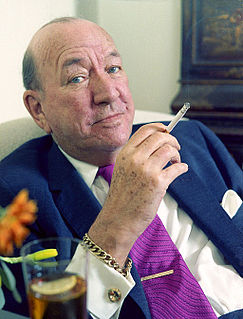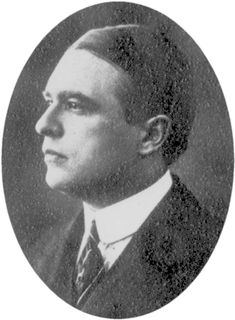
Private Lives is a 1930 comedy of manners in three acts by Noël Coward. It concerns a divorced couple who, while honeymooning with their new spouses, discover that they are staying in adjacent rooms at the same hotel. Despite a perpetually stormy relationship, they realise that they still have feelings for each other. Its second act love scene was nearly censored in Britain as too risqué. Coward wrote one of his most popular songs, "Some Day I'll Find You", for the play.

Blithe Spirit is a comic play by Noël Coward. The play concerns the socialite and novelist Charles Condomine, who invites the eccentric medium and clairvoyant, Madame Arcati, to his house to conduct a séance, hoping to gather material for his next book. The scheme backfires when he is haunted by the ghost of his annoying and temperamental first wife, Elvira, after the séance. Elvira makes continual attempts to disrupt Charles's marriage to his second wife, Ruth, who cannot see or hear the ghost.

Gertrude Lawrence was an English actress, singer, dancer and musical comedy performer known for her stage appearances in the West End of London and on Broadway in New York.
Paris is a musical with the book by Martin Brown, and music and lyrics by Cole Porter, as well as Walter Kollo and Louis Alter (music) and E. Ray Goetz and Roy Turk (lyrics). The musical, which premiered on Broadway in 1928, was Porter's first Broadway hit. The musical introduced the song "Let's Do It, Let's Fall in Love" sung by the show's star, Irene Bordoni. The story involves a young man from a very proper family in Newton, Massachusetts whose mother is horrified by his intention to wed a French actress.

Sir Charles Blake Cochran, generally known as C. B. Cochran, was an English theatrical manager and impresario. He produced some of the most successful musical revues, musicals and plays of the 1920s and 1930s, becoming associated with Noël Coward and his works.
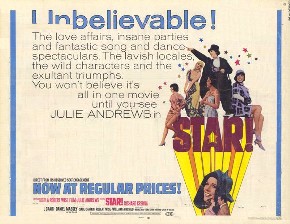
Star! is a 1968 American biographical musical film directed by Robert Wise and starring Julie Andrews. The screenplay by William Fairchild is based on the life and career of British performer Gertrude Lawrence.

London Calling! was a musical revue, produced by André Charlot with music and lyrics by Noël Coward, which opened at London's Duke of York's Theatre on 4 September 1923. It is famous for being Noël Coward's first publicly produced musical work and for the use of a 3-D stereoscopic shadowgraph as part of its opening act. The revue's song "Parisian Pierrot", sung by Gertrude Lawrence, was Coward's first big hit and became one of his signature tunes.
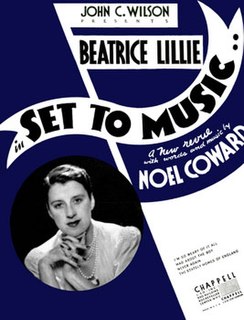
Set to Music is a musical revue with sketches, music and lyrics by Noël Coward.
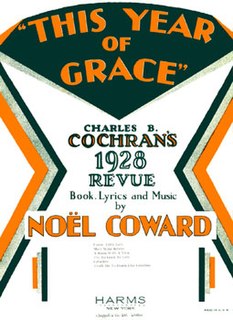
This Year of Grace is a revue with a book, music, and lyrics by Noël Coward.
Constance Emmeline Carpenter was an English-born American film and musical theatre actress.
"I Went to a Marvellous Party" is a song with words and music by Noël Coward, written in 1938 and included in the revue, Set to Music. Although a melody exists, the text is most often recited over a piano accompaniment. Out of Noël Coward's approximately 300 songs, this piece is one of his most popular, ranking among the top 30 in royalty potential.

A prolific playwright and successful actor and director, Noël Coward has had a significant impact on culture in the English-speaking world. Time magazine said that he had a unique "sense of personal style, a combination of cheek and chic, pose and poise".

Sigh No More is a musical revue consisting of twenty-two scenes and numbers composed, written and produced by Noël Coward, with additional items by Joyce Grenfell, Richard Addinsell and Norman Hackforth. The show was Coward's first post-World War II musical and starred Cyril Ritchard, his wife Madge Elliott and Joyce Grenfell. It also featured Graham Payn, Coward's longtime partner, who sang the best-known song in the show, the wistful "Matelot".
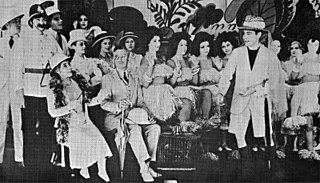
Words and Music is a musical revue with sketches, music, lyrics and direction by Noël Coward. The revue introduced the song "Mad About the Boy", which, according to The Noël Coward Society's website, is Coward's most popular song. The critics praised the show's sharp satire and verbal cleverness.
Philip Braham was an English composer of the early twentieth century, chiefly associated with theatrical work. From 1914, he composed music for such musicals and revues as Theodore & Co (1916) and London Calling! (1923), including several revues produced by André Charlot. His best-known song is "Limehouse Blues," which has been recorded by many artists. He wrote for film in the 1930s.
Tails Up! was a 1918 London revue presented by André Charlot starring Jack Buchanan. The premiere took place at the Comedy Theatre, London on 1 June 1918 with Philip Braham conducting the band, and the show ran for 467 performances.

Kenneth Hare Bicker-Caarten was an English actor who worked under the name Kenneth Carten.
